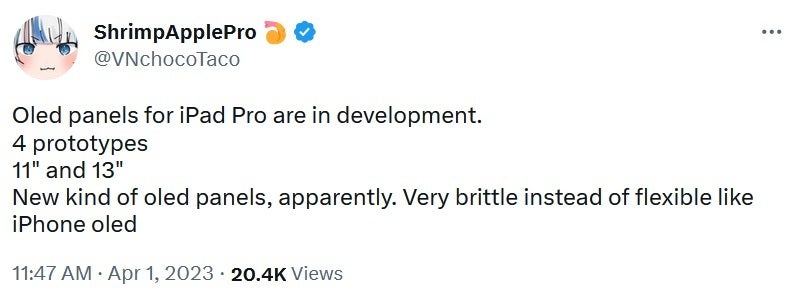
The first iPad to feature an AMOLED display is supposed to arrive next year in the form of the iPad Pro (2024). According to tipster ShrimpApplePro (via Wccftech), Apple has reportedly started the work needed on its end to start development of the AMOLED iPad Pro models. There are four prototypes in development the tipster wrote in a tweet which also noted that the screen sizes are 11 inches and 13 inches (12.9-inch).
ShrimpApple Pro has some more news to add on this front as his tweet says that the OLED panels are not the same as the ones used on the iPhone. Instead of being flexible like the OLED displays used for Apple’s smartphones, the panels earmarked for the iPad Pro are brittle. This means that these displays are more rigid with less give. Such OLED panels are used on the Pixel 6 and Pixel 7 lines. While less expensive to produce than the flexible kind, the rigid panels are said to provide users with awful viewing angles.
Samsung is believed to be producing two-stack tandem OLED panels for the 2024 iPad Pro models using two emission layers. These layers produce the lighting for the display so that backlighting is not necessary as it is with LCD screens. Using two layers will double the brightness of the screen while allowing it to have a lifespan that is four times that of an OLED panel with just one emission layer.
This is a more expensive process and thanks to the higher cost of producing these displays, prices for the 2024 iPad Pro models could be as much as 80% higher. The 11-inch iPad Pro (2024) could start at $1,500 while the 12.9-inch iPad Pro (2024) could be priced at $1,800 and up. For such a huge leap in the pricing of the two tablets, these screens need to be simply amazing.

Tipster ShrimpApplePro tweets some rumors about Apple using OLED panels for the 2024 iPad Pro models
Currently, the 11-inch iPad Pro uses an LCD display that Apple calls a “Liquid Retina display.” The 12.9-inch iPad Pro uses mini-LED technology that Apple has named “Liquid Retina XDR display.” Using smaller but a larger number of LEDs to backlight the display, mini-LED screens deliver deeper blacks, more vivid colors, and a 1,000,000:1 contrast ratio. But both displays could be replaced next year by the aforementioned AMOLED screens.






